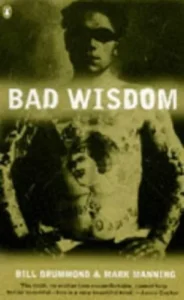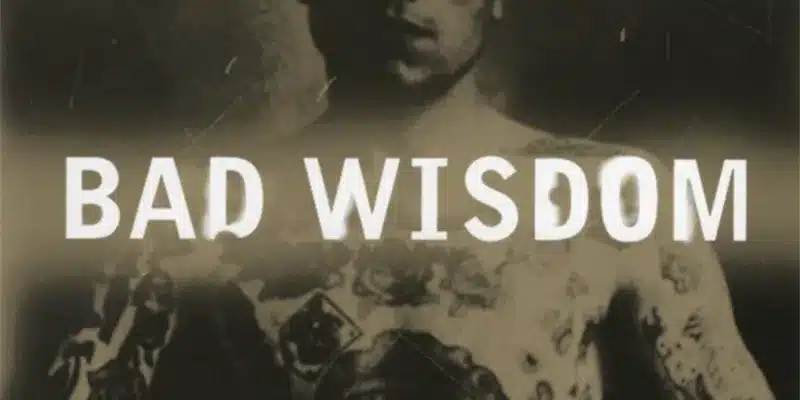
Bad Wisdom is a brilliantly savagely offensive, gleeful parody of the rock ’n’ roll messiah complex, the seeker-narrative, and the entire tradition of male spiritual self-aggrandisement.
 Bad Wisdom Bill Drummond and Mark Manning Penguin UK October 1996
Bad Wisdom Bill Drummond and Mark Manning Penguin UK October 1996
In my many years as a reader and writer, there are only a few books to which I can endlessly return. J.R.R. Tolkien’s The Lord of the Rings is one (though some sections now tire me, mostly when hobbits are absent). James Clavell’s Shōgun is another. I hope you caught FX’s Shōgun series; it was sublime. A third perennial of my reading diet is Bad Wisdom.
Bad Wisdom is probably less well-known, but early 1990s music fans may remember the group the KLF, whose album The White Room dominated UK music charts. After conquering the music world, the KLF (actually two men, Bill Drummond and Jimmy Cauty) then auto-destructed in amazing style, performing an unlistenable version of “3AM Eternal” with grindcore band Extreme Noise Terror at the 1992 Brit Awards.

As the song ended, singer Bill Drummond fired a machine gun at the audience of record industry executives and fellow musicians. (The gun had blanks, but no one knew that at the time). They left a dead sheep outside the afterparty. They then deleted their back catalogue, so no one could buy their records. Two years later, on the remote Scottish island of Jura, they burned the remainder of their KLF income. You can watch it on YouTube as they burn a million pounds. (It’s, like, a statement. Though of what, no one seems sure.)
Bad Wisdom’s Zenarctic Pilgrims
Bad Wisdom is a collaboration between Drummond and another rock oddity, Mark Manning, also known as Zodiac Mindwarp (great name), or in the book, simply Z. Manning started as a cartoonist but reinvented himself as a sleazy rock demigod, fronting a band that never quite broke through. Their raunch-heavy glam metal, while knowingly absurd, felt out of place in Britain. (It’s hard to personify unrealisable dreams if you come from Swindon or Scarborough, as good bands like XTC and the Little Angels learned).
So these aren’t traditional rock musicians. Bad Wisdom is not a traditional book. It may be the most radical, poetic, and hysterically funny novel you’ve never read. Jacques Derrida observed in Acts of Literature (1991), “the space of literature… is a fictive institution which in principle allows one to say everything… to break out of prohibitions.” That permission to say everything, even the obscene, the blasphemous, the socially unacceptable, is central to Bad Wisdom.
At first glance, Bad Wisdom is appalling: it’s deeply racist, sexist, homophobic, narcissistic, and utterly scatological. But that’s the surface. Beneath the bluster, however, lies one of the most inventive literary performances of the past 30 years: a savage, gleeful parody of the rock ’n’ roll messiah complex, the seeker-narrative, and the entire tradition of male spiritual self-aggrandisement.
Drummond and Manning alternate not chapters, but sections in each running from one line to several pages, creating a syncopated duet where reality is always destabilised by perception. Together (while accompanied by friend, manager, and feral accomplice Gimpo), they compose a book obsessed with meaning and its absence: mystical signs and ley lines, Elvis Presley, the baby Jesus, and biker Vikings appear as cracked attempts to locate the sacred.
Bad Wisdom‘s prose veers from exquisite lyricism to adolescent filth – sometimes in the same paragraph – and their deliberate take on Romantic excess is brutal and brilliant. These men aren’t heroes. They’re knowingly vile, self-parodying grotesques who weaponise the transgressive licence of literature to explode their own egos. Bad Wisdom, hence, doesn’t offer morality. It is an act of literary derangement in the most serious sense: a Dionysian howl dressed as a lad-mag Brits-abroad trip to nowhere important. Their singular attempt to take a photograph of Elvis Presley to the North Pole might also be the most beautifully funny thing you’ll ever read.
Bad Wisdom‘s Regular Bunch of Misogynistic Homophobic Bigots

Let’s start with Bad Wisdom‘s deliberate offensiveness. Homophobia, racism, and sexism are everywhere. Not in a mild, “I’m not sure about those gay guys down the street” sort of way. Not even in a pub-level “bloody foreigners” sort of way. No. Bad Wisdom goes for the jugular, with lurid, baiting tales of Jack The Ripper-style evisceration of a prostitute, James Bond style-escape from imprisonment (with the evisceration of a captor, a “Nazi kung fu sex bitch with a Rottweiler”), and caricatures of black gay dancers (who also get eviscerated, of course) who “squeal delightedly and practise their lascivious dance routines, thrusting, fisting, fellating”. As well as death, there’s grotesque sex: the supermodels who get shit on; the bus station greeting party who perform fellatio; the “serving-wenches [who] were being raped and taking it all in good spirit”.
Yet, somehow, none of this seems hateful. There’s no icy precision à la American Psycho, no humorless fury like Mein Kampf. It’s vaudeville grotesque, not fascist realism. It feels like performance, theatre, excess. Bad Wisdom is offensive in the same way François Rabelais or Jonathan Swift (of Gulliver’s Travels, etc.) is offensive. It pushes things so far that the boundaries crack, and what seeps through is not hatred but a sort of demented grace. The bigotry inverts.
What’s the point behind this? Are Drummond and Manning just being knowingly offensive? Well, yes, and no. Drummond and Manning come from rock performance, which requires a heroic posture, grandiosity, and ego hypertrophy (just look at Axl Rose or Michael Jackson). In Bad Wisdom, they don’t just wear the mask; they amplify it to outrageous levels and dare you to keep watching. The deliberate offensiveness is part of a larger comic strategy to inflate the narrative ego to absurd proportions, then puncture it with bathos, vulgarity, and spiritual slapstick. (Nose-picking and farting are peppered liberally throughout).
Drummond and Manning thus parody the very idea of the rock star as visionary, or the male seeker of enlightenment. So they call themselves the Three Wise Men, and cunningly reference TS Eliot’s poem, “Journey of the Magi”. The joke, ultimately, is on themselves. It’s also on us, for believing in the myth of the wise man with a guitar or the finder of wisdom waiting for a donation. “First seek the truth within” is one of the oldest spiritual injunctions, and one of the hardest to take. Can’t you, like, just give me the answer? (You can see John Lennon thinking this when meeting with Maharishi Yogi.)
The heady brew of self-mockery and spiritual seeking in Bad Wisdom can be seen from the first page:
This was the plan: we would take a holy and sacred picture of the King of Rock’n’Roll, Elvis Presley, to the very summit of the earth; once there, we would place it with sincere reverence amongst the chimerical shimmering palaces of ice and snow and then (accompanied by some weird Zen magic) we would light joss sticks, dance about making screechy kung-fu noises, get off our faces, and that would be it: Planet Earth saved. Simple.
The tonal contrast between the gorgeous “chimerical shimmering palaces of ice and snow” and the plan to “dance about making screechy kung-fu noises” is typical: beautifully set up only to be bathetically deflated. Another example: “Unfortunately, Bill’s promising pharmaceutical career ended suddenly in the early eighties when it was discovered that he planned to destabilize the world economy by manufacturing millions of tons of gold by means of alchemy and black magic. This magnificent global sedition was terminated only when he was caught stealing lead from the roof of his local Presbyterian church.”
The sacred collapses into the stupid; the visionary into the ridiculous. The collapse is the point.
Bad Wisdom keeps circling the possibility that somewhere in all this absurdity, there might still be a real yearning. A longing for grace, meaning, and transformation. The comedy never quite kills the quest; it merely refuses to sanctify it. They’re mocking themselves, yes, but they’re also asking whether the sacred can still exist in a world this degraded, and whether revelation might just arrive dressed in piss and glitter.
Bad Wisdom‘s Poetry, Lies, and Gimpo

The language in Bad Wisdom is astonishing, used not just for description, but as an assault. It marries florid, baroque poeticism with full-frontal obscenity, shifting effortlessly from Blakean rhapsody to something that would get you banned from polite society. It’s not just that Manning and Drummond have a way with words. It’s that they weaponise them, turning diction into delirium. Here are some memorable jewels of phraseology:
- Framed in the doorway, a phantasmagorical vision of decadent splendour: an eldritch, rotund figure in a pink crushed-velvet catsuit spattered with all manner of radiant jewellery, posing like a Shirley Bassey from some weird hallucinogenic nether dimension.
- Potent vodka heat swam through my veins like benign electric violence, a toxic anaconda warming my guts and making me feel at peace, in a superior-fire-power kind of a way, with mankind and the world. Helsinki railway station loomed in the distance: a pink granite, brass and wood palace styled in the national Romantic Gothic.
- The sodium yellow lights from the Helsinki suburbs were twinkling amongst the black houses and swirling snow. I could hear the swooping gasps and sighs of wife-swapping kissing our carriage window.
- Wisdom and hallucinogenic realities pour like the Bible, an avalanche of poetry, crazier than Revelations and wiser than Solomon, neon words flashing from the fifth dimension.
- The sun was a pale disc, alive and taunting us with evil games. Unlike the warmer latitudes with their sunrises and sunsets, this hellish hyperborean vista possessed a malignant orb that perpetually circled the horizon like some patient airborne predator waiting for the kill.
This is lyricism pushes to the edge of reason. It’s like Vladimir Nabokov‘s Lolita rewritten by an amphetamine-fuelled Ken Russell. The prose sparkles and shimmers. Just as you surrender to the beauty, they hit you with the filth.
- It was truly horrible, a veritable pantheon of scatological Third Reich, shit-eating horror: pictures of naked nubiles strapped to torture contraptions, old men with semi-erections and Nazi armbands defecating on their hairless, pubescent pudenda.
- A hot horse’s flow of steaming piss pulsed from Gimpo’s ugly distended member; he was urinating over the incredulous supermodel, his venomous flood mixing with the black excrement to create a vile brown paste. A demon from the greasiest slime pit of hell, Gimpo was stripped naked, a demented shite eagle, Priapus, Lord of the Blowflies, smearing slippery ordure all over the poor girl’s body. He wrestled with her and, in the process, covered them both in loose stools. Sloppy lumps congealed in their eyebrows and pubic hair, the diarrhoeic paste streaking their bodies like a cheap fake sun-tan cream.
- Gimpo, naked, with an erection, patrolled the perimeter of the pit like some gremlin Priapus from a mad homosexual dream.
- Bill started doing his bizarre Scottish war dance, chainsaw held high over his head, stamping the sand like some terrible Hindu deity, flicking his tongue in and out in a horrible Haka sex-jig. He threw poses like a sexually insane Chris Eubank and occasionally stopped to oil his erection with grease from his chainsaw.
This is not transgression in the usual literary sense, like Sam Raimi‘s The Evil Dead or the Bret Easton Ellis character, Patrick Bateman, with a chainsaw. Bad Wisdom is unhinged, Wagnerian delirium. What’s extraordinary about it is the verbal precision. The rhythm, the syntax, the comedic escalation: you can’t write this badly by accident. You write it with the gleeful madness of someone determined to see how far the literary form can be stretched before it collapses in on itself.
In this light, Bad Wisdom becomes something astonishing: not just obscene, but operatic. It’s Rabelais meets British adult comics Viz filtered through acid trips and Marquis de Sade. The offence is part of the orchestration, the grime is part of the glory. It is an attempt to break the boundaries and see what lies beyond. The journey that is outward is always also one that is inward.
Drummond and Manning know this, and underline this point with references to themselves as the Magi, and to their favourite poets, William Blake and William Wordsworth. Drummond writes:
Don’t get me wrong _ I love Blake; he sends shivers down my spine. I stand in awe, shuddering with fear at his abstract depiction of the abyss. The trouble is, most of his goes straight over my head. I get the drift but then lose the plot. The thing is, I can’t really argue the case with Z, ’cause Z is Los, and Z’s approach to his work is the same as Blake’s. He is inspired by what he finds in his ever-expanding imagination, whereas I find that when April comes and I stumble on a bank of primroses glinting at the sun, all my senses reach out to the mystery at the heart of Creation. Blake criticized Wordsworth for paying too much attention to the details of nature at the expense of the inner realities. But what can you do if it is through the real, natural “out there” world that God finds his way to you?
One finds truth within; one finds truth without. This degree of psychological awareness is rare and deeply informs Bad Wisdom‘s narrative style.
The Literary Arseholes
The narrative structure is yet another part of what makes Bad Wisdom unique. With Drummond and Manning narrating it section by section, their takes interweave with each other. This is managed with enormous skill and humour. Like the best jokes, the passages undercut and contradict each other. So after nearly three pages of Manning describing an execution scene while with the Biker Vikings, he ends by describing Drummond as provoked to a display of hysterical masculinity:
Bill leapt to his feet and started throwing noble poses, staring at imaginary horizons, hand heroically placed on his hip. He broke into his weird Highland-fling war dances, stomping up and down and waving his wedding tackle at the serving-wenches — the bastard was into it, his macho Celtic pride inflamed.
By this time, we’ve forgotten that in Drummond’s previous section, he had screamed and kicked a chair, upset at seeing MTV. So his next section catches everyone unaware, and beautifully heightens Manning’s description:
Egocentric dramatic pose or a soul crushed beyond breaking point? Maybe both.
Sometimes the fun is in reading these guys describing the same event, a section at a time. Drummond’s prose style is naturalistic and moralising, Manning’s is hyper-literate, cartoonish, and evil:
The car comes to a halt. In front of us is a huge iron door in the mountainside, a tunnel entrance closed off for the winter. So this is it; this is as far as we get and no further: the Green Door that’s not so green or the hidden entrance to the Secret Garden. You want symbolism, there’s plenty to choose from. Ask Ali Baba.
I looked around for the cause of the collision and what I saw made me fill my pants once more: a huge iron door, forty feet high, set in the mountain. It was covered with massive bolts, cast-iron skulls, devils, bats and all kind of weird Dracula shit; an enormous ring knocker shaped like a Viking’s head hung dead centre. On either side of the door, two mammoth tusks framed the entrance. The ground started to shake, an ominous rumble, a deafening metallic whine of giant bones, Victorian machinery, distressed metal, grinding chains and levers. The door was slowly inching its way from the ground into the rock above. A vile blast of fetid air rushed out of the black hole. It was warm and stank of copulating skunks, blood and death.
At other times, Manning’s version of reality is clearly a heightened extension of Drummond’s.
Off. Up through dark empty streets, mountains of snow-ploughed snow on either side, small houses huddling the frozen earth. Taxi driver performs feats of driving unknown in any other part of the world. Pull up outside nondescript house. “Wait here. I will just be a few seconds,” Olden assures us in his confident English as he gets out of the taxi and disappears behind the house.
We ascended a stone spiral staircase in hangover silence. It was freezing. My nicotine-racked lungs pushed curling vapour into the air where it seemed to freeze instantly. After 2,300 granite steps (I counted), we reached an oak door, where we rested an hour.
In about five minutes Olden returns. Back in the taxi, he pulls out from under his sports jacket (note: no quilted thermal Arctic coat) two large green plastic bottles of 7-Up. Why on earth all this mystery and time-wasting to pick up a couple of bottles of pop?
Ragnar passed around a foul alcoholic drink.
He offers me a swig. We are guests, I don’t want to insult his hospitality. I take a swig. My tongue is on fire, my throat explodes and my guts erupt.
Bill threw up.
By using these storytelling strategies, Bad Wisdom doesn’t just show how people perceive things differently; it shows how they construct entirely different worlds. Reality is malleable, shaped by personal vision, impulse, and delusion. This kind of altered perception can be felt in psychedelic songs like “Strawberry Fields Forever”, where brass is slowed and deepened, cellos rise into ornate counterpoint, a plucked zither flickers across the spectrum, and Lennon’s voice—lowered by a tone—becomes incantatory. Every sonic element is altered as a metaphor for his inner world.
Individual voice is, of course, central to poetry and fiction. But Bad Wisdom goes further than any other text I’ve read. It doesn’t just give its narrators distinctive vocabularies, it gives them entirely different realities, which may but not always clash and interweave.
So café owner Lars in Drummond’s reality becomes Ragnar, chief of the Biker Vikings named Sons of the Horned One, and the Chippendale male strippers become Fabio: “a bronzed god of a man, an Arctic Adonis, a Nordic David, naked, arms folded, standing astride the ley line. He appeared to be carved from sandalwood. His waist-length hair hung in shining tresses upon a muscular torso; an iron jaw, eyes as piercing and blue as those of a desert nomad scouring pyramid horizons; massive knob.” (And then the punchline: “He radiated a beatific calm and did not seem the slightest bit homosexual.”)
What Bad Wisdom understands, and constantly enacts, is that perception isn’t passive but a mode of personal dramatisation. We don’t just see the world: we narrate it, embellish it, drench it in private meaning until it becomes something else entirely. No two perceptions are the same. In this way, the book doesn’t just parody a spiritual quest: it shows how all meanings, all visions, are forms of hallucination. Bad Wisdom is the psychedelic novel par excellence: not a trip you take, but one that takes you. You’ll never be the same again.
The Waste Land in the Wasted Land of Bad Wisdom
Why a quest, though? Why not just some journey? Why do they need to have this sense of personal mission?
Good question. What haunts Bad Wisdom is not the absence of women and children, though there is that, but the absence of meaning in the modern world. Especially for men. This explains the numerous references to The Waste Land. (At one point, Drummong and Manning allegedly listen to a reading of it, in English, on the radio, while driving through Finland. Right).
T.S. Eliot’s poem famously searches through the fragments of modernity in a time when belief is exhausted. Bad Wisdom does the same, both structurally (the three men take a journey to lay rock n’ roll to rest) but also consciously, throughout the narrative. Drummond says, towards the end:
Us men, we don’t know why we are here; we have been given no clear-cut purpose. So we attempt to discover meaning, devise laws, invent gods; we dream up ideals and carve out countries that we have to go to war to defend; we form football leagues we have to win. And because we cannot give birth, yes, create in the truest sense of the word, we go out endlessly and pathetically writing our Fifth Symphonies, painting our Sistine Chapels, writing our Rise and Falls, tending our lawns to be the most perfect in all England. But in the end they are like so many dry wanks…
I look longingly back over history to times of apparent certainties. In my grandfather’s generation it was simple: men went across the sea and gave their life on a foreign field for God, King and Country. But the war was won or lost, so what next; where then? When Neil Armstrong took those first steps on the moon, he should have said, “One small step for man, one giant dry wank for mankind.”
Beneath the absurdist bigotry, the nose picking and cartoon violence, Bad Wisdom is structured around a deeply traditional impulse: the need for meaning, and the yearning to mark the passing of time with ritual. Just as The Waste Land laments a world emptied of gods and redemptive stories, Drummond and Manning recognise that the modern world no longer offers myths sturdy enough to carry male identity through transition. So they invent their own, cobbled from Elvis, acid trips, Viking cosplay, Romantic poets, and the mythology of rock ’n’ roll.
Their pilgrimage is comic and pathetic, vulgar and sincere. Yet it’s not trivial. Like Eliot’s collage of voices, Bad Wisdom tries to build a ceremony out of cultural detritus. Because what else is there? The result is both ridiculous and moving: a quest in a godless world, a search for sacred fire in the ruins of Top of the Pops. The landscape may be absurd, but the hunger is real. That’s what makes Bad Wisdom more than parody. It’s a desperate cry for meaning; three shambolic shamen questing through the Waste Land of 1990s postmodernism.
“Shantih, Shantih, Shantih”
Bad Wisdom was published in 1996. I received a copy in 1997, and for about four years, I read it monthly and religiously. I used to carry it round with me, and read passages to friends and acquaintances, some amused, some baffled, some appalled. It made me realise there were many more things that language could do than I had previously thought. The book’s epigraph is perfectly chosen:
The otherworld is not a myth, but a reality, and in all ages there have been souls who have been willing to brave the great adventure, and to risk all for the chance of bringing back with them some assurance of the future life.
Bad Wisdom is a book that changed how I think, read, and write. It’s absurd and offensive, yes. It’s also wise, wild, and oddly sacred. It is the story of a journey into the otherworld. Once you’ve read it, you’ll know where that world is. I can commend no book more highly.


